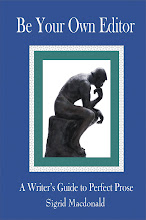Recently, I wrote a book review on
Fifty Shades of Grey, the new runaway bestseller about Anastasia
Steele, a naïve young woman who falls for Christian Grey, a man who can only
derive pleasure from a dominant/submissive relationship. Christian is perfect
in every respect except sexually; he is damaged and can only be aroused by
inflicting pain. This is not exactly our dream man, but readers love the book.
Why? Aside from some very steamy sex scenes, Anastasia is confused, bewildered,
and ambivalent about her relationship with Christian. This creates good
reading.
It makes her a three-dimensional character and provides
suspense; we don't know if she will stay with Christian. It makes her
sympathetic. We feel for her dilemma. She's crazy about him, but he's just
plain old crazy (unless you’re a fan of sadomasochism).
Thus, in real life we may prefer partners who are relatively
drama free, but this would make for very boring literature. When you are
developing your characters, make sure they have enough conflict, both
internally, within themselves, and externally with other people.
Sigrid Macdonald is the author of three books, including
Be Your Own Editor, and two erotic short
stories, which she wrote under the pen name Tiffanie Good. Silver Publishing
just released "The Pink Triangle," a tale of friendship, lust, and
betrayal. You can view her story here:
http://tinyurl.com/6v65rgr 

